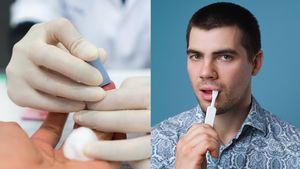The United Nations has compiled a draft report that uses pseudoscience to wrongly claim that transgender acceptance "erase[s] the legal category of women” and that gender dysphoria is somehow “socially contagious.”
The preliminary report on sex-based violence against women and girls from the Office of the United Nations High Commissioner for Human Rights lumps in recent advancements in trans rights with actual physical and sexual violence as issues facing women and girls today, claiming that trans people deny “their rightful recognition as a distinct category in law and society.”
Compiled by the special rapporteur on violence against women and girls, Reem Alsalem, the report also highlights the supposed “harmful consequences of social and medical transitioning of children.” Alsalem referred to gender dysphoria as "socially contagious," and recommended banning gender-affirming care for anyone under the age of 18.
"The Special Rapporteur’s draft report perpetuates inaccurate and harmful assumptions about transgender people," Maria Sjödin, executive director of Outright International, told The Advocate. "Women and girls face violence — including sexual violence, intimate partner violence, and practices like female and intersex genital mutilation — because of patriarchal power structures and rigid gender norms, not because of the existence or legal recognition of trans people. Meanwhile, the rates of femicide and gender-based violence affecting trans women and girls are alarmingly high."
"By misplacing the blame for violence against women onto an already marginalized group, the Special Rapporteur lets patriarchy off the hook — and ultimately undermines the safety and dignity of the very women and girls she is mandated to protect," Sjödin said.
The so-called "Rapid Onset Gender Dysphoria" hypothesis that claims being trans is a "trend" has long been debunked as junk science. The entire theory is based on a single poster abstract in 2017 by Lisa Littman. Poster abstracts are often published when the material is not only too weak to be a journal article, but of insufficient quality to even be accepted for oral presentation at a conference. Littman herself has admitted that it is not a formal diagnosis.
A 2022 study in Pediatrics found that out of 91,937 adolescents in 2017 and 105,437 in 2019, the total percentage of those who identified as trans decreased from 2.4 percent in 2017 to 1.6 percent in 2019, which would not support the "social contagion" hypothesis. Researchers concluded that ROGD "should not be used to restrict the provision of gender-affirming medical care."
While ROGD claims that young people are identifying as trans rather than as gay, lesbian, or bisexual because they see being trans as more socially acceptable, there is no data to show that trans youth find more acceptance than LGB youth. Conversely, trans people are more likely to be the victim of violence than their LGB peers, and are significantly more likely to be the victim of violence than the perpetrator.
The American Medical Association, the American Psychiatric Association, the American Academy of Pediatrics, the American Academy of Child & Adolescent Psychiatry, the World Medical Association, and the World Health Organization all agree that gender-affirming care is evidence-based and medically necessary not just for adults, but minors as well. Out of 55 peer-reviewed studies, not a single one found that gender transition has negative outcomes.
Alsalem also praised a recent ruling in the United Kingdom determining that trans women aren’t considered women under the nation’s Equality Act. Anti-trans group For Women Scotland challenged a 2018 Scottish law that legally recognized trans women as women, initially losing its case before appealing to the U.K. Supreme Court, which usurped Scotland's national sovereignty to rule in its favor in April.
The country's Equality and Human Rights Commission issued guidance shortly after the ruling that banned trans people from single-sex facilities — in some cases, even those that match their sex assigned at birth. Prime Minister Keir Starmer has also called on public agencies to enforce the ruling by banning trans people from facilities that align with their gender identities. Some have already applied it, including the Football Association, which banned trans women from playing women's soccer in May.
Meanwhile, hate crimes against trans people have increased almost 200 percent in the last five years in England and Wales, according to the U.K. government.
“Transgender people, like all people, are who they are — and have always been here. But this report is loaded with stigmatizing, outright false, and downright bizarre theories about the existence of transgender people that are detached from science and divorced from reality," a spokesperson for the Human Rights Campaign said. "On top of that, the report is a cruel detour from the Commission’s stated purpose of addressing the real, pervasive forms of sex discrimination that women and girls face globally."
"The truth remains: gender affirming care is best practice, medically necessary care endorsed by every major American health association," they continued. "And for so many people, it is lifesaving care. We should all be on the side of advancing people’s freedom to get the care they need.”










































































